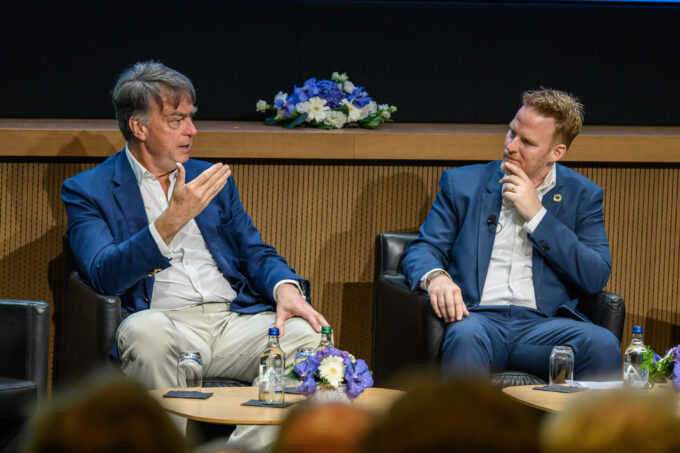Localization – where effective supply chain management meets smart politics
With global threats from COVID to trade tensions exposing companies to costly disruptions, leaders should be thinking about supply chain resilience and regionalization ...
2 September 2024 • by Julia Binder in Sustainability
Capitalism must be amended to include the interests of nature and society....
Industrial capitalism has undeniably lifted millions out of poverty and extended our healthy lifespans, but it’s increasingly clear that its current approach is failing both nature and society. Prosperity is poorly managed and often destructive.
During the global launch of The New Nature of Business by André Hoffmann and Peter Vanham, I moderated a panel exploring how to reinvent business models to create sustainable prosperity. Hoffmann and Vanham argue that businesses must consider their effects on “the three Cs” – social, natural, and human capital – and understand how these interact.
“We don’t need to throw away the capitalistic system, we need to amend it,” said Hoffmann in an opening conversation with new IMD President David Bach. Specifically, we need to move away from the prevailing model of short-term profit maximization, championed by Milton Friedman in the 1960s, where society was left to deal with the negative externalities of value creation. “These externalities are getting too large to ignore because they are making it harder for businesses to create value.”
Hoffmann highlighted Roche, his family’s business where he serves as Vice Chairman, as an example. The Swiss drugmaker spent over 100 million Swiss francs to clean up the Rhine river in Basel, once known as Europe’s sewer. While it was costly and a hit to short-term profits, this move has paid off, as other firms now face even greater pressure and higher costs to follow suit.
To shift away from a focus on short-term profits, businesses need to quantify social and environmental impacts on their balance sheets, he said. “Accountants are going to save the planet,” Hoffmann said. “If we can put nature onto the balance sheet then suddenly you realize that it’s not for free, but it does have a cost. We need to be able to talk about nature in the way that we talk about time and talent and financing. Nature matters.”
The technology is not holding us back. Nature is not holding us back. We’re holding ourselves back. Which is why the conversation triggered by this book is so important.- David Bach, President of IMD
The book includes examples of companies that have reinvented their business model as a force for good, including those in traditionally hard-to-abate sectors like cement. Swiss buildings materials giant, Holcim, for example, has embarked on a transformation to become carbon neutral and nature positive.
“Doing good is actually good business,” said Chief Sustainability Officer Nollaig Forrest, citing her main takeaway from the book “If you apply that to how you run any company, figuring out where your externalities are, and figuring out how, through your own business model, you can tackle them, you can make exponential impact.”
Forrest described how Holcim’s transformation was triggered by a point of crisis about its future, and driven by visionary leadership and the bold decision to set a roadmap towards net zero. Recognizing that its greatest impact lay in how it generates revenue rather than how it spends it, Holcim innovated by introducing ECOpact, a low-carbon concrete range that now represents 28% of its ready-mix sales, surpassing its 2025 target of 25%. The company also launched ECOcycle, a circular technology platform that recycles construction demolition materials into new buildings.
Lastly, by collaborating with external stakeholders, including local building authorities, Holcim successfully influenced building norms.

It’s not just multinationals that have the power to drive change. Smaller organizations, such as startups, also have a role to play in dismantling the status quo and changing the system step by step.
Frederic James Gentizon, CEO of Innergia, a local, renewable-energy cooperative, challenged the notion that the average individual cares about climate change. Instead, his company has put a different lens on the issue by focusing on the threat of power shortages to help empower local communities to become independent by producing their own sources of renewable energy. “The idea is to put people back in balance with their local resources,” he explained.
Hoffmann agreed that collaboration across stakeholders will be necessary. “Planetary limits and social systems are absolutely linked. We won’t bring about a long-term change about how we consume resources if we don’t address social issues,” he said.
All panelists agreed that regulation will be crucial in driving systems change so that businesses start to internalize social and environmental costs into the price rather than being rewarded for producing at the lowest cost regardless of the impact on nature and society.
Effective regulation should foster a partnership between the private sector and regulators to create value, rather than merely imposing restrictions or encouraging businesses to bypass rules, said Hoffmann.
“In order to change the system,we need an economic system based on added value,” added Gentizon.
For those who may still be questioning whether sustainable business models can truly be profitable, Holcim’s Forrest had a heartening message. Its circular technology platform, which involves turning demolition waste into building materials, has become one of its most profitable business lines, highlighting how moving away from a “take-make-waste” business model can give you a sustainable edge.
“If you can make that happen at scale, you can unlock a lot of value,” she emphasized.
Summarizing the discussion, IMD President David Bach said an overriding theme had been the centrality of people in the new nature of business, from visionary leaders to initiatives at the local level.
“In some ways that may seem like bad news, because it’s hard for people to change. But I think it is good news because people can change the system. It’s as simple as that,” he said. “The technology is not holding us back. Nature is not holding us back. We’re holding ourselves back. Which is why the conversation triggered by this book is so important.”

Professor of Sustainable innovation and Business Transformation at IMD
Julia Binder, Professor of Sustainable Innovation and Business Transformation, is a renowned thought leader recognized on the 2022 Thinkers50 Radar list for her work at the intersection of sustainability and innovation. As Director of IMD’s Center for Sustainable and Inclusive Business, Binder is dedicated to leveraging IMD’s diverse expertise on sustainability topics to guide business leaders in discovering innovative solutions to contemporary challenges. At IMD, Binder serves as Program Director for Creating Value in the Circular Economy and teaches in key open programs including the Advanced Management Program (AMP), Transition to Business Leadership (TBL), TransformTech (TT), and Leading Sustainable Business Transformation (LSBT). She is involved in the school’s EMBA and MBA programs, and contributes to IMD’s custom programs, crafting transformative learning journeys for clients globally.
27 September 2021 • by Salvatore Cantale, David Bach in Sustainability • 7 min read
With global threats from COVID to trade tensions exposing companies to costly disruptions, leaders should be thinking about supply chain resilience and regionalization ...
27 September 2021 • by George Kohlrieser in Sustainability • 3 min read
Awareness, acceptance and action – these are the three vital steps needed to make sure that you can perform at your optimum....
24 September 2021 • by John Elkington, Sonja Haut in Sustainability • 11 min read
Negative screening is well established among ESG and other impact investors, involving the avoidance of downside exposures, but the next generation will demand far more positive results. ...
23 September 2021 • by Natalia Olynec in Sustainability • 4 min read
A recent series of books provide a detailed roadmap to sustainability through a mixture of bold thinking and practical steps. Here are the ones on our reading list. ...
22 September 2021 • by Knut Haanaes in Sustainability • 10 min read
The world’s topsoil is badly eroded and there may be only 60 harvests left. But solutions are at hand, says Geraldine Matchett of nutrition company Royal DSM....
21 September 2021 • by Patrick Reinmoeller, Karl Schmedders in Sustainability • 6 min read
Should Germany’s Green party score a big enough share of the vote in a federal election on 26 September to enter the next coalition government, business should embrace the opportunity to accelerate...
21 September 2021 • by Amanda Williams, Gail Whiteman, John N. Parker in Sustainability • 12 min read
The UN set ambitious targets to clean up the world by 2030, but business leaders need to do more to make them a reality....
20 September 2021 • by Eva Zabey in Sustainability • 7 min read
The destruction of natural ecosystems poses major risks for businesses and could wipe $10 trillion from the global economy. The time to act is running out. ...
20 September 2021 • by Karl Schmedders in Sustainability • 4 min read
Anyone who demands that environmental damage should be priced into services and goods today is far from being a socialist. They are just canny, calculating capitalists. ...
16 September 2021 • by Serra Cremer Iyi, Dorothée Baumann Pauly in Sustainability • 7 min read
The mineral is a vital component of electric car batteries, but small-scale miners, including children, are working in harsh conditions. Alliances need to be forged in the supply chain to make cobalt...
 Audio available
Audio availableExplore first person business intelligence from top minds curated for a global executive audience